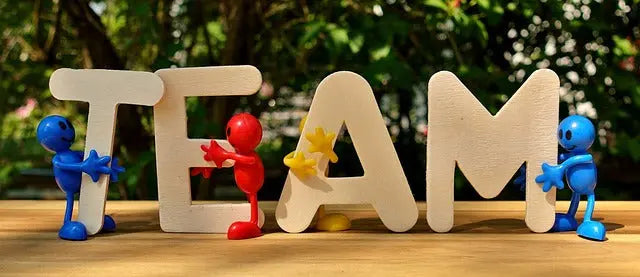Want to build a winning trivia team? Here’s a quick guide to forming teams that excel while keeping trivia nights fun and engaging. Success comes down to five key strategies:
- Assemble a Diverse Team: Combine members with expertise in different areas like pop culture, history, and sports for well-rounded knowledge.
- Strengthen Communication: Build trust, listen actively, and practice clear communication to make confident decisions under pressure.
- Prepare Effectively: Attend trivia nights regularly, use practice resources, and track progress to improve your team’s performance.
- Organize Roles: Assign team members to specific categories based on their strengths but stay flexible during games.
- Maintain a Positive Atmosphere: Celebrate wins, learn from mistakes, and create traditions that keep the team motivated and excited.
Quick Tip: Balance competition with fun to keep your team coming back for more. Dive into the full article for detailed advice on each strategy.
5 Ways to Improve Your Trivia Skills
Tip 1: Assemble a Diverse Team
Building a strong trivia team isn't just about finding people who enjoy trivia; it's about gathering individuals with a range of knowledge and skills. A well-rounded team is more likely to excel, thanks to its ability to tackle questions across various topics.
Identify Member Strengths
Start by figuring out what each potential team member knows best. Look for people with expertise in different areas like pop culture, history, sports, or current events. By discussing everyone's interests and strengths, you can ensure your team is prepared to handle a mix of trivia categories.
Create a Comfortable Team Environment
For a diverse team to succeed, every member needs to feel comfortable sharing their knowledge. Teams of 4-6 members are ideal because they combine a variety of perspectives with easy collaboration [1]. To create a positive atmosphere:
- Listen actively to all team members.
- Celebrate successes and handle mistakes with support.
- Encourage balanced participation, ensuring everyone’s input is valued.
- Help quieter members feel included without letting louder voices dominate.
When everyone feels like their contributions matter, they're more likely to share ideas and insights. This leads to better teamwork, improved accuracy, and higher scores. A welcoming and collaborative environment makes it easier to tap into the full potential of your team's combined knowledge.
Tip 2: Strengthen Team Dynamics and Communication
When a team works smoothly and communicates well, they’re better prepared to handle tough questions and make quick, confident decisions under pressure.
Build Trust and Work Together
Trust grows when every team member’s input is valued, and decisions are made collectively. For tricky questions, encourage everyone to share how confident they are in their answers. This approach taps into the group’s combined expertise and ensures smarter choices.
Regular practice sessions can also help teammates understand each other’s thought processes, problem-solving styles, and response patterns. Over time, this builds trust and boosts confidence in one another’s abilities.
Sharpen Communication Skills
Clear communication can be the difference between winning and losing. Assign a question leader to ensure everyone understands the question, use quick votes to resolve disagreements, and hold post-game discussions to tweak strategies.
Good communication isn’t just about speaking - it’s also about listening. Create an environment where everyone feels safe sharing their ideas, even if they’re unsure. This kind of supportive atmosphere helps the team perform at its best.
Once your team has strong dynamics and communication, they’ll be ready to aim for consistent success.
Tip 3: Prepare Effectively
Good preparation can turn a group of people into a well-organized team ready to handle any trivia challenge. It’s not just about showing up on game night - consistent practice and smart preparation can make all the difference in your team’s confidence and performance.
Attend Trivia Nights Regularly
Going to trivia nights often helps your team get used to the types of questions, improve timing, and build confidence. It also sharpens your ability to process questions faster and adapt to different trivia formats. Trying out multiple venues can introduce your team to a variety of hosting styles and question types, giving you an edge as competitors.
Use Resources Like Cheap Trivia

Cheap Trivia's Weekly Trivia Subscription offers a range of questions and formats that can help your team sharpen its skills. To get the most out of your practice sessions:
- Rotate through different categories and question types.
- Experiment with challenging formats to broaden your experience.
- Track your progress to see where you excel and where you need work.
- Spend extra time on weaker categories while maintaining your strong areas.
These practice sessions not only improve knowledge but also help your team develop strategies for consistent performance. Monitoring your progress ensures you’re always improving and refining your approach.
Once you’ve prepared thoroughly, it’s time to focus on organizing roles to maximize your team’s potential on game night.
sbb-itb-46dff1a
Tip 4: Organize Team Roles
Getting your trivia team organized can make all the difference between a fun night and a winning one. By assigning roles and staying adaptable, your team can work smarter and boost its chances of success.
Assign Categories to Members
Instead of relying solely on individual knowledge, assign team members to specific categories. Think history, sports, pop culture - whatever fits the trivia format. Match these roles to each person's strengths. For example, your sports enthusiast is likely to know more about recent games than someone who last followed the World Cup in 2010.
This setup ensures that your team covers a wide range of topics efficiently. Plus, it helps streamline decision-making when time is tight. The goal is to make sure everyone contributes where they shine.
Stay Flexible During Games
While roles provide structure, don’t let them limit your collaboration. Trivia often throws curveballs, so encourage everyone to chime in, even on topics outside their assigned category. Quick discussions, team votes, or a team captain can help resolve disagreements and tackle unexpected questions.
Clear communication is key. Stick to the roles when they make sense but be ready to adjust on the fly. This mix of structure and flexibility keeps the team dynamic and ready for anything.
With roles in place and a flexible approach, your team will not only perform better but also enjoy the process. Trivia nights are about having fun, and a well-organized team makes that even easier [1].
Tip 5: Maintain a Positive Team Atmosphere
Creating a welcoming and upbeat environment helps strengthen team bonds, boosts collaboration, and keeps everyone excited about coming back for more trivia nights. Teams that balance having fun with performing well often stick together longer and see better results.
Celebrate Wins and Learn from Mistakes
Trivia nights are more than just a competition - they're a chance to grow, regardless of the outcome. After each game, take a moment to review tough questions as a group. Celebrate small victories, like improving your score or answering a tricky question correctly. Hurrdat Sports Bar reminds us:
"Don't be too focused on winning. Remember, bar trivia is supposed to be fun" [1]
Keep track of your team's progress over time, focusing on how you're improving rather than just tallying wins. Share fun facts from incorrect answers to turn mistakes into interesting learning moments.
Recognize Effort and Reward Participation
Acknowledging contributions and achievements keeps everyone motivated. Celebrate milestones, individual efforts, and team progress regularly. Bar None Games highlights the importance of this:
"encouraging participation is key to making your virtual trivia game a success" [2]
Introduce team traditions to keep things lively. For example, let the person who answers the final question correctly pick the next week's team name, or ask the first person to arrive to bring snacks. These little rituals build team spirit and make trivia nights something everyone looks forward to.
Conclusion: Building Successful Trivia Teams
Creating a thriving trivia team comes down to a few key elements that make the experience enjoyable and effective. A great trivia team combines a variety of knowledge and skills, ensuring members complement one another. Structured roles and open communication help teams tackle challenges and stay consistent in their performance.
Balancing competitiveness with fun is crucial. Teams that enjoy themselves are more motivated and likely to stick around for the long haul. For venues, supporting these principles can elevate the trivia experience and build a loyal crowd. Offering resources like Cheap Trivia's themed question packs keeps the content fresh and engaging, ensuring teams stay interested and excited to participate.
Consistency is essential for maintaining momentum. Here’s a quick breakdown of strategies for building and sustaining a successful trivia team:
| Success Factor | Strategy |
|---|---|
| Team Diversity | Bring in members with different strengths |
| Communication | Clearly define roles and encourage dialogue |
| Preparation | Practice regularly and attend trivia nights |
| Atmosphere | Celebrate wins and offer constructive feedback |
Building a successful trivia team takes commitment and a willingness to adapt. As teams grow and learn, they should be open to tweaking their approach based on experience and feedback, ensuring they continue to improve and enjoy the journey.
FAQs
How to build a trivia team?
Creating a trivia team that performs well takes some planning and organization. Here are some tips to help you get started:
Team Size and Structure: Aim for a group of 4-6 players. This size ensures you have a mix of knowledge and smooth communication. Assign categories based on each person’s strengths to cover as many topics as possible.
Category Coverage: Use a simple chart to assign primary and backup experts for key trivia areas like history, pop culture, and sports. This setup ensures you’re well-prepared across all categories.
Communication Strategy: Good communication is essential. Share confidence levels for answers on a scale of 1 to 5, and let a designated captain make the final decision. This approach keeps things organized and boosts accuracy.
Practice Schedule: Stay sharp by practicing regularly, at least twice a month. Use various trivia resources, such as Cheap Trivia's themed question packs, to keep your team engaged and prepared [1].
Essential Roles: Define clear roles within the team. For example, have a captain for decision-making and category specialists to focus on specific areas. These roles help streamline efforts and improve performance [1].
Team Motivation: Keep track of your team’s scores and progress to stay motivated. As Bar None Games highlights:
"encouraging participation is key to making your virtual trivia game a success" [2]
Lastly, don’t forget the advice from Hurrdat Sports Bar:
"Don't be too focused on winning. Remember, bar trivia is supposed to be fun" [1]
